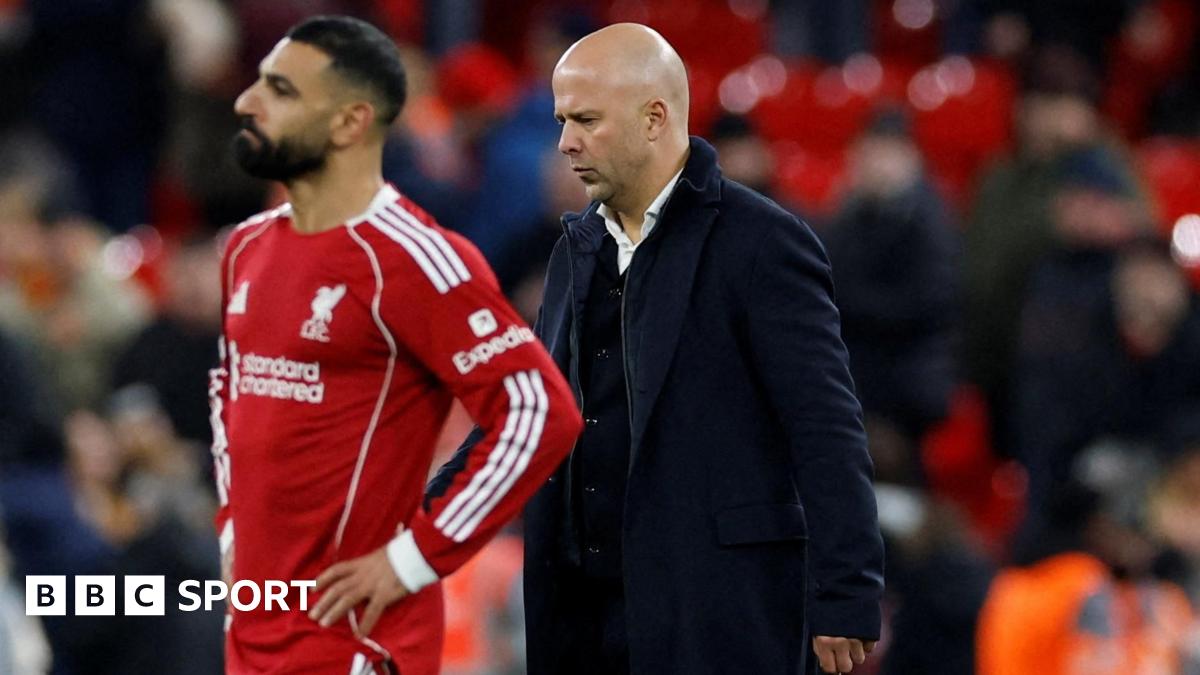Liverpool: Champions League humiliation puts pressure on Arne Slot as Reds need solution to struggles
Liverpool’s stellar start was followed by a run of six defeats in seven matches that sparked concern and talk of a crisis.
Things started to look up earlier in November, with victories over Aston Villa and Real Madrid lifting morale and offering hope of a return to form.
But they ultimately proved not to provide a permanent change in their fortunes, but a momentary respite.
A 3-0 defeat by Manchester City just before the international break was tough, but can happen against Pep Guardiola’s side.
But a setback by the same scoreline to Sean Dyche’s Nottingham Forest left them 12th in the Premier League and now followed by this embarrassing loss against PSV – only their second at Anfield in their past 26 pre-knockout stage games in this competition.
It has left Slot with a massive task on his hands to return his side to the top half of the Premier League and remain in the hunt for a top-eight place in the Champions League league phase, having slipped down to 13th.
“I don’t think there should be a knee-jerk reaction, I think this is a very tough moment at Liverpool for one reason or another, but the one thing I’d say is that things weren’t right at the start of the season either, when they were winning,” added Warnock.
Sacking managers at the first sign of trouble is not a tactic Liverpool have frequently deployed. Let’s not forget too that last year Slot oversaw the best ever start – eight wins in his first 10 top-flight games – by a Reds boss, having just replaced Jurgen Klopp.
But his summer signings have not worked, putting him under pressure.
Record transfer Alexander Isak is still yet to get off the mark, German playmaker Florian Wirtz is currently injured and left-back Milos Kerkez continues to struggle.
Yet on Wednesday, Slot made just two substitutions as his side trailed. One was Isak for fellow new signing Hugo Ekitike, who looked to have picked up an injury, while the other was Italy forward Federico Chiesa for Ibrahima Konate during another tough evening for the French defender.
“This run is a shock for everyone,” admitted Slot.
“For the players, for me. I don’t easily shock and it’s very unexpected. We can all do better individually, but that goes for everyone including myself.”
The brightest spark has perhaps been Dominik Szoboszlai.
Reinstated in his role in central midfield against PSV, he provided not only a goal, but energy and an attacking threat, while going some way to proving there are significantly better uses for him than as a stand-in right-back.
“With each defeat it gets closer to being a crisis,” former Liverpool captain Steven Gerrard told TNT Sports. “I don’t think Liverpool are at that [yet] – crisis is too strong.
“There are no excuses for a performance like that at this football club
“You cannot deny the team is struggling massively, they are on a terrible run, their confidence is at an all-time low, they are wide open.
“Unless the manager can find answers and stability in his team, then this situation is going to continue.”
PSV, though, was never going to be an easy fixture for Slot to try to get his players back on track.
The former Feyenoord boss has only won one of his past eight games against the Eredivisie outfit in all competitions (D3 L4), and against no side has he suffered more defeats in his managerial career.
Slot says he is not worrying about his future at the club and is instead focused on turning things around.
“I need to do better, that’s what I’m trying to do every single day to improve the team and that is where my main focus is,” added the 47-year-old.
